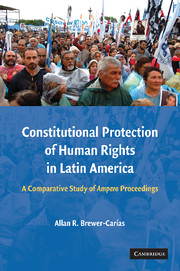 Constitutional Protection of Human Rights in Latin America
Constitutional Protection of Human Rights in Latin America Book contents
- Frontmatter
- Contents
- INTRODUCTION
- PART ONE THE CONSTITUTIONAL AND INTERNATIONAL DECLARATION OF HUMAN RIGHTS AND ITS JUDICIAL GUARANTIES
- PART TWO THE AMPARO AS A LATIN AMERICAN CONSTITUTIONAL AND INTERNATIONAL LAW INSTITUTION
- Chapter Three Judicial Review and Amparo Proceedings in Latin America
- Chapter Four The Amparo Action in Countries That Apply Only the Diffuse Method of Judicial Review of Legislation
- Chapter Five The Amparo Action in Countries that Apply Only the Concentrated Method of Judicial Review of Legislation
- Chapter Six The Amparo as a Constitutional Right in Countries with Mixed Systems of Judicial Review of Legislation
- Chapter Seven The Amparo as a Constitutional Guaranty in Countries with Mixed Systems of Judicial Review of Legislation
- Chapter Eight The American Convention on Human Rights and the Internationalization of the Amparo in Latin America
- PART THREE THE INJURED PARTY AND THE CONSTITUTIONAL RIGHTS PROTECTED BY MEANS OF THE AMPARO PROCEEDING
- PART FOUR THE INJURY, THE INJURING PARTY AND THE INJURING ACTS OR OMISSIONS IN THE AMPARO PROCEEDING
- PART FIVE THE EXTRAORDINARY CHARACTER OF THE AMPARO PROCEEDING
- CONCLUSION
- APPENDIX A List of Latin American Constitutions
- APPENDIX B List of Latin American Amparo Laws (Statutes)
- INDEX
Chapter Six - The Amparo as a Constitutional Right in Countries with Mixed Systems of Judicial Review of Legislation
Published online by Cambridge University Press: 08 August 2009
- Frontmatter
- Contents
- INTRODUCTION
- PART ONE THE CONSTITUTIONAL AND INTERNATIONAL DECLARATION OF HUMAN RIGHTS AND ITS JUDICIAL GUARANTIES
- PART TWO THE AMPARO AS A LATIN AMERICAN CONSTITUTIONAL AND INTERNATIONAL LAW INSTITUTION
- Chapter Three Judicial Review and Amparo Proceedings in Latin America
- Chapter Four The Amparo Action in Countries That Apply Only the Diffuse Method of Judicial Review of Legislation
- Chapter Five The Amparo Action in Countries that Apply Only the Concentrated Method of Judicial Review of Legislation
- Chapter Six The Amparo as a Constitutional Right in Countries with Mixed Systems of Judicial Review of Legislation
- Chapter Seven The Amparo as a Constitutional Guaranty in Countries with Mixed Systems of Judicial Review of Legislation
- Chapter Eight The American Convention on Human Rights and the Internationalization of the Amparo in Latin America
- PART THREE THE INJURED PARTY AND THE CONSTITUTIONAL RIGHTS PROTECTED BY MEANS OF THE AMPARO PROCEEDING
- PART FOUR THE INJURY, THE INJURING PARTY AND THE INJURING ACTS OR OMISSIONS IN THE AMPARO PROCEEDING
- PART FIVE THE EXTRAORDINARY CHARACTER OF THE AMPARO PROCEEDING
- CONCLUSION
- APPENDIX A List of Latin American Constitutions
- APPENDIX B List of Latin American Amparo Laws (Statutes)
- INDEX
Summary
THE AMPARO ACTION IN COUNTRIES WITH MIXED SYSTEMS (DIFFUSE AND CONCENTRATED) OF JUDICIAL REVIEW
Except in the case of Argentina, which remains the most similar to the “American model,” the system of judicial review in all the other Latin American countries applying the same diffuse method of judicial review has moved from the original, exclusively diffuse one toward a mixed one, by also adopting the concentrated method. This is the case in Brazil, Colombia, Dominican Republic, Ecuador, Guatemala, Mexico, Nicaragua, Peru and Venezuela. That means that in these countries, for the resolution of particular cases or controversies, all the courts are empowered to decide upon the unconstitutionality of legislation, and not to apply for the resolution of the case statutes they considered contrary to the constitution, giving preference to the latter; and at the same time, the Supreme Court or the Constitutional Court or Tribunal is also empowered to decide upon the unconstitutionality of statutes, when requested through a direct action that can be filed by some high public officials or by the citizenship, or when deciding incidental referrals on the constitutionality of statutes submitted by lower courts, with powers to annul, with general effects, the challenged statutes.
This has happened even in Mexico, a country that with the peculiarities of its juicio de amparo also moved in 1994 from the original diffuse system of judicial review, initially and precisely established with the amparo suit, to the current mixed system of judicial review by attributing to the Supreme Court the power to annul, with general effects, statutes directly challenged by some high officials.
- Type
- Chapter
- Information
- Constitutional Protection of Human Rights in Latin AmericaA Comparative Study of Amparo Proceedings, pp. 120 - 138Publisher: Cambridge University PressPrint publication year: 2008


